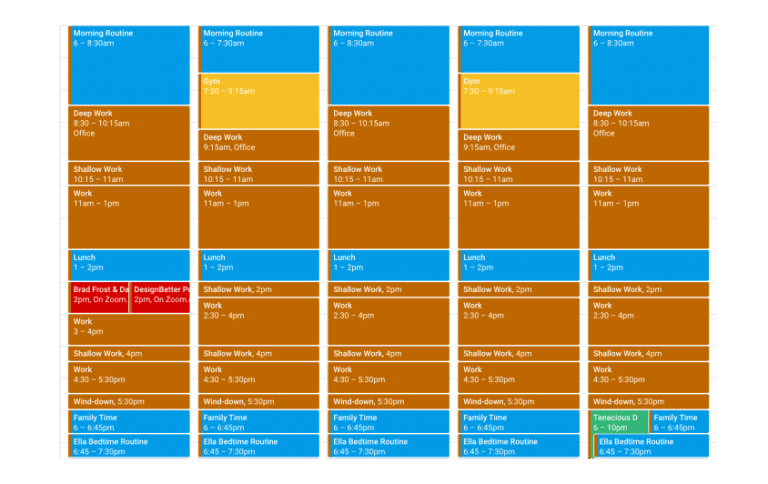Learn more about remotework with this collection
Strategies for building self-confidence
Techniques for embracing your strengths and accomplishments
Tips for seeking support and feedback
The human brain needs guardrails at work. Otherwise, we fall into what's known as Parkinson's Law:
"Work expands so as to fill the time available for its completion"
By scheduling every minute of your day you not only guard against distraction but also multiply your focus.
Single-tasking -focusing on one task at a time-can make you up to 80% more productive than splitting your attention across multiple tasks. Plus, when you know you have time set aside later for checking email or replying to Slack messages you're less likely to give into the FOMO these tools create.
1.3K
767 reads
MORE IDEAS ON THIS
The first question you need to answer is: Why do you want to use time blocking?
Is it because you want more time for focused work ? Or to reduce your
1.29K
741 reads
Again, how Brad blocked out his time was based on his priority of spending time with his family. As Brad told us :
"Before having a baby, my wife and I would both work well into the evening hours, largely because we cou...
1.29K
750 reads
Want to see some real-world examples of schedules designed for focus? Check out our guide to setting up a work scheduled designed for sustained attention .
One of the great things about time blocking is that it can be dead simp...
1.29K
756 reads
Potential issues aside, time-blocking is still a powerful time management strategy . Especially when you see it as a framework for thinking about your day rather than a set of laws you can't break.
As Abby Lawson writes in
1.29K
747 reads
As Deep Work author Cal Newport writes :
"Sometimes people ask why I bother with such a detaile...
1.29K
758 reads
Time blocking is all about focus. To stay on task during each block, I like to use a simple Pomodoro timer (Right now I use Be Focused ). Having your remaining time visible can be a huge motivator and also help ...
1.3K
739 reads
What's your morning routine ? How will you disconnect from work and make time for friends, family, and hobbies? These tasks are just as, if not more important ...
1.29K
740 reads
Related collections
Other curated ideas on this topic:
Time blocking and focus
By scheduling every minute of your day you not only guard against distraction but also multiply your focus.
Also, focusing on one task at a time can make you up to 80% more productive than splitting your attention across multiple tasks.
Time pressure and procrastination
Leaving a task to the last minute may makes us feel like we are working faster to complete the task. However, it does not mean we work better.
Time pressure generally impairs performance because it limits thought and action. Parkinson's law suggests that "work expands so as to fill th...
Set an ending time for tasks
Parkinson’s second law: Work expands so as to fill the time available for its completion.
Setting a micro deadline for daily tasks holds your brain accountable to the tick of the clock.
Read & Learn
20x Faster
without
deepstash
with
deepstash
with
deepstash
Personalized microlearning
—
100+ Learning Journeys
—
Access to 200,000+ ideas
—
Access to the mobile app
—
Unlimited idea saving
—
—
Unlimited history
—
—
Unlimited listening to ideas
—
—
Downloading & offline access
—
—
Supercharge your mind with one idea per day
Enter your email and spend 1 minute every day to learn something new.
I agree to receive email updates
